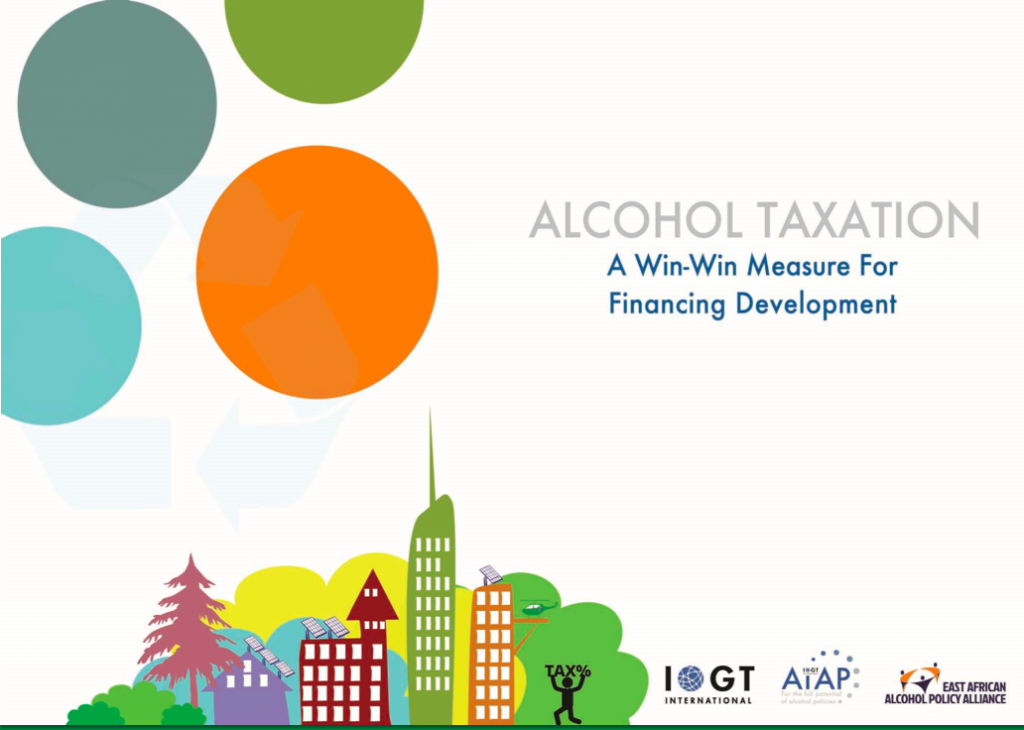
25 Sep, 2015
Higher alcohol taxes can help meet UN Sustainable Development Goals – IOGT Report
Arusha, Tanzania, September 24, 2015 (IOGT International media release) – A new report by the Swedish-based global advocacy group IOGT International provides an overview of independent scientific evidence showing that alcohol taxation is a powerful tool for both improving public health as well as for boosting sustainable development.
This week, global leaders will gather at the United Nations in New York to adopt a new and visionary development agenda – the so-called Sustainable Development Goals. For achieving this ambitious sustainable development agenda, it is of crucial importance for governments, especially in low- and middle income countries around the world, to raise funds.
IOGT International and EAAPA have collaborated to compile a landmark report detailing the science behind the effects of alcohol taxation, and outlining the mechanisms of taxation and its consequences for fiscal space, health promotion and sustainable development. The report presents findings from independent science and provides data and examples of success stories from around the world.
Launching the report at a press conference in Arusha, Tanzania and in front of a media crowd comprising radio, TV, print and online Dr. Bertha Maegga, of EAAPA, and Mr. Maik Dünnbier, of IOGT International stressed for messages:
1) Alcohol taxation is a win-win measure: The report, provides an overview of evidence from around the world, showing that alcohol taxation is a powerful tool with a double positive effect: it reduces the burden of alcohol as obstacle to development and it raises funds for welfare policy measures.
2) Alcohol is an obstacle to development: Alcohol harm places a burden on human beings, their families and communities, workplaces and companies, and on society at large. Alcohol use causes public health harm, social harm, economic harm, and it is a Human Rights issue. The report provides data showing that alcohol is an obstacle to 11 out of the 17 new Sustainable Development Goals.
3) Alcohol policy measures are powerful, yet under-utilised tools to promote health and well-being and to foster sustainable development. The report shows that putting in place alcohol taxation in an evidence-based manner would have tremendous positive effects for government revenue. Similar to tobacco taxation, it is a tool that should be used for financing the post-2015 development agenda.
4) Alcohol taxation can help achieving 10 out of 17 SDGs. Employing evidence-based alcohol taxation measures reaps benefits across 10 out of 17 SDGs. Building on evidence from among others the World Bank, World Economic Forum, the OECD, the World Health Organisation the report finds that 10 out of the 17 new Sustainable Development Goals are positively impacted by alcohol taxation measures. Some of these SDGs are poverty eradication, good health, quality education, gender equality, safer cities, economic growth and peace.
The report concludes: Alcohol taxation is a win-win measure for increasing fiscal space, boosting health promotion and financing sustainable development.
IOGT International is the largest worldwide community of non-governmental organisations with a mission to independently enlighten people around the world on a lifestyle free from alcohol and other drugs. IOGT International works to harness the potential of human beings, to support families, to strengthen communities and to develop society. The aim of IOGT International, founded in 1851, is the liberation of peoples of the world leading to a richer, freer and more rewarding life. As a means of attaining this aim, IOGT International promotes a lifestyle free of alcohol and other drugs. Today the headquarters of IOGT International are situated in Stockholm, Sweden.




Liked this article? Share it!